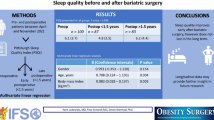Abstract
Background
Shortened sleep duration causes hormonal and metabolic changes that favor fat accumulation and weight gain. Obesity, in turn, may reduce sleep quality and contribute to sleep loss. The purpose of this study was to evaluate the sleep durations of individuals with morbid obesity, compared to their nonobese counterparts, and to determine the effects of surgical weight reduction on sleep duration and sleep quality.
Methods
The study population included 45 bariatric (BA) surgical patients (mean body mass index [BMI] = 49) and 45 gender-matched nonobese controls (NC; BMI = 24). Self-reported sleep durations were obtained and overall sleep quality was assessed using the Pittsburgh Sleep Quality Index (PSQI).
Results
The data show that average sleep durations of the preoperative BA patients were significantly (p < 0.0001) less than those of the NC, i.e., 6.0 and 7.2 h, respectively. Sleep loss for the BA patients was associated with poor sleep quality, along with an increased frequency of conditions that interfere with sleep, including coughing and snoring, difficulty breathing, feeling too hot, and experiencing pain. Overall, 78% of the BA patients, compared to 36% of the NC, had PSQI scores indicative of poor sleep quality. Surgery after 3 to 12 months resulted in significant (p < 0.0001) weight loss (percentage total change in BMI = 34) and improved sleep quality, i.e., PSQI = 8.8 preoperatively vs. 4.6 postoperatively. Sleep durations increased significantly (p < 0.0001) post-surgery from 6.0 to 6.8 h.
Conclusions
Individuals with extreme obesity, compared to the nonobese, obtain less sleep and experience poorer sleep quality. Bariatric surgery improves sleep duration and quality.



Similar content being viewed by others
References
Knutson KL, Spiegel K, Penev P, et al. The metabolic consequences of sleep deprivation. Sleep Med Rev. 2007;11:163–78.
National Center for Health Statistics. Percentage of adults who reported an average of ≤6 hours of sleep per 24-hour period, by sex and age group—United States, 1985 and 2004. Morb Mortal Wkly Rep. 2005.
Taheri S, Lin L, Austin D, et al. Short sleep duration is associated with reduced leptin, elevated ghrelin and increased body mass index. PLoS Med. 2004;1:e62.
Cappuccio FP, Taggart FM, Kandala NB, Currie A, Peile E, Stranges S, et al. Meta-analysis of short sleep duration and obesity in children and adults. Sleep. 2008;31:619–26.
Gangwisch JE, Malaspina D, Boden-Albala B, et al. Inadequate sleep as a risk factor for obesity: analysis of NHANES I. Sleep. 2005;28:1289–96.
Hasler G, Buysse DJ, Klaghofer R, et al. The association between short sleep duration and obesity in young adults: a 13-year prospective study. Sleep. 2004;27:661–6.
Patel SR, Hu FB. Short sleep duration and weight gain: a systematic review. Obesity. 2008;16:643–53.
Lopez-Garcia E, Faubel R, Leon-Munoz L, et al. Sleep duration, general and abdominal obesity, and weight change among the older adult population of Spain. Am J Clin Nutr. 2008;87:310–6.
Chaput JP, Despres JP, Bouchard C, et al. The association between sleep duration and weight gain in adults: a 6-year prospective study from the Quebec Family Study. Sleep. 2008;31:517–23.
Nedeltcheva AV, Kilkus JM, Imperial J, et al. Insufficient sleep undermines dietary efforts to reduce adiposity. Ann Intern Med. 2010;153:435–41.
Spiegel K, Tasali E, Penev P, et al. Brief communication: sleep curtailment in healthy young men is associated with decreased leptin levels, elevated ghrelin levels and increased hunger and appetite. Ann Intern Med. 2004;141:846–50.
Spiegel K, Leproult R, L’hermite-Baleriaux M, et al. Leptin levels are dependent on sleep duration: relationships with sympathovagal balance, carbohydrate regulation, cortisol and thyrotropin. J Clin Endocrinol Metab. 2004;89:5762–71.
Copinschi G. Metabolic and endocrine effects of sleep deprivation. Essent Psychopharmacol. 2005;6:341–7.
Van Cauter E, Holmback U, Knutson K, et al. Impact of sleep and sleep loss on neuroendocrine and metabolic function. Horm Res. 2007;67:2–9.
Morselli L, Leproult R, Balbo M, et al. Role of sleep duration in the regulation of glucose metabolism and appetite. Bes Prac Res Clin Endocrinol Metab. 2010;24:687–702.
Schmid SM, Hallschmid M, Jauch-Chara K, et al. A single night of sleep deprivation increases ghrelin levels and feelings of hunger in normal weight healthy men. J Sleep Res. 2008;17:331–4.
Kotani K, Sakane N, Saiga K, et al. Serum adiponectin levels and lifestyle factors in Japanese men. Hear Vessel. 2007;22:291–6.
Simpson NS, Banks S, Arroyo S, et al. Effects of sleep restriction on adiponectin levels in healthy men and women. Physiol Behav. 2010;101:693–8.
Buysse DJ, Reynolds 3rd CF, Monk TH, et al. The Pittsburgh Sleep Quality Index: a new instrument for psychiatric practice and research. Psychiatry Res. 1989;28:193–213.
Maddi SR, Fox SR, Khoshaba DM, et al. Reduction in psychopathology following bariatric surgery for morbid obesity. Obes Surg. 2001;11:680–5.
Kolotkin RL, Crosby RD, Gress RE, et al. Two-year changes in health related quality of life in gastric bypass patients compared with severely obese controls. Surg Obes Relat Dis. 2009;5:250–6.
Friedman KE, Ashmore JA, Applegate KL. Recent experiences of weight-based stigmatization in a weight loss surgery population: psychological and behavioral correlates. Obesity (Silver Spring). 2008;16(2):69–74.
Szklo-Coxe M, Young T, Finn L, et al. Depression: relationships to sleep paralysis and other sleep disturbances in a community sample. J Sleep Res. 2007;16:297–312.
Vahtera J, Kivimaki M, Hublin C, et al. Liability to anxiety and severe life events as predictors of new-onset sleep disturbances. Sleep. 2007;30:1537–46.
Berk M. Sleep and depression—theory and practice. Aust Fam Physician. 2009;38:302–4.
Conflicts of Interest
Patricia Toor, Keith Kim, and Cynthia Buffington have no conflicts of interest regarding the content of this manuscript.
Author information
Authors and Affiliations
Corresponding author
Rights and permissions
About this article
Cite this article
Toor, P., Kim, K. & Buffington, C.K. Sleep Quality and Duration Before and After Bariatric Surgery. OBES SURG 22, 890–895 (2012). https://doi.org/10.1007/s11695-011-0541-8
Published:
Issue Date:
DOI: https://doi.org/10.1007/s11695-011-0541-8




